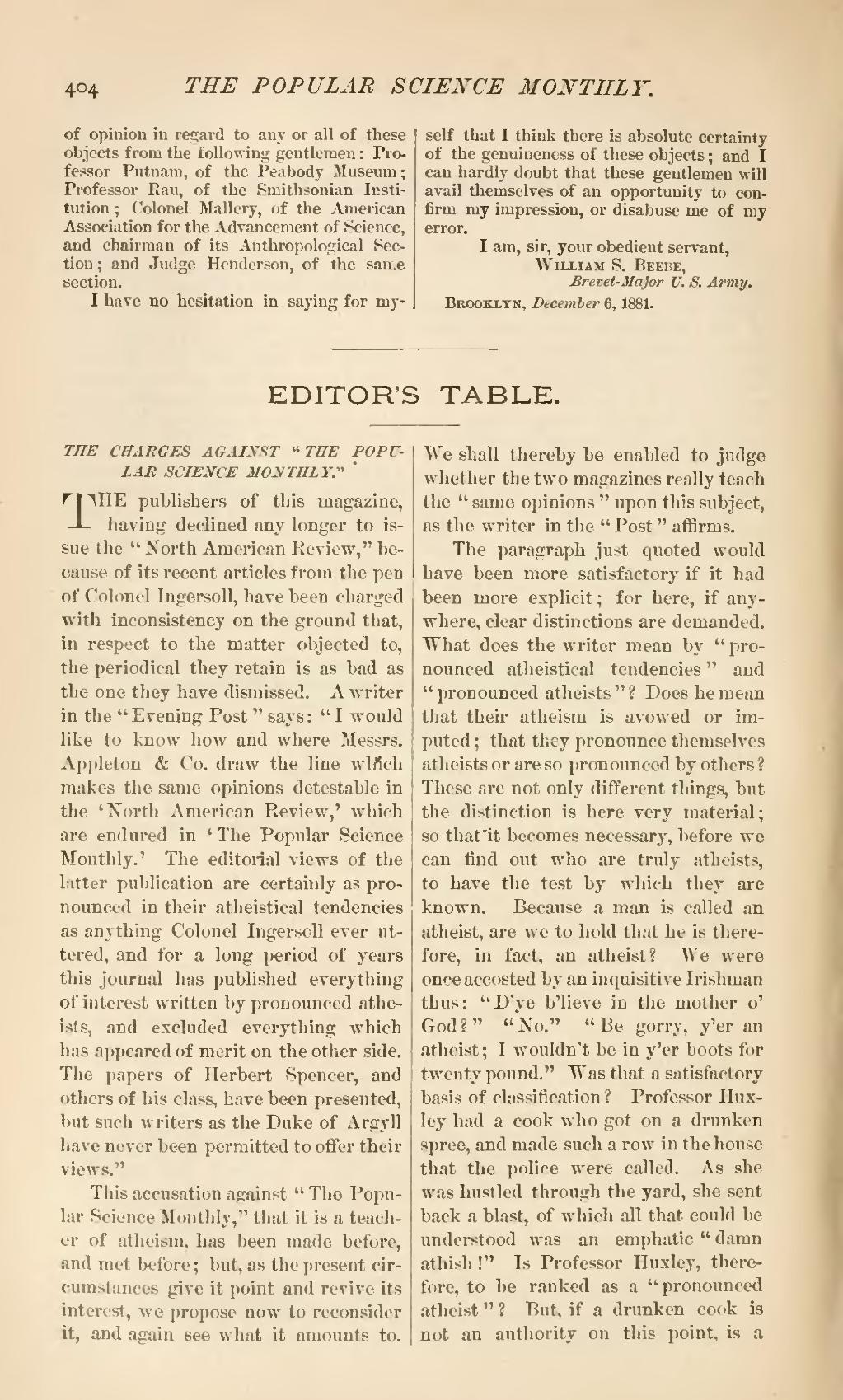of opinion in regard to any or all of these objects from the following gentlemen: Professor Putnam, of the Peabody Museum; Professor Rau, of the Smithsonian Institution; Colonel Mallery, of the American Association for the Advancement of Science, and chairman of its Anthropological Section; and Judge Henderson, of the same section.
I have no hesitation in saying for myself that I think there is absolute certainty of the genuineness of these objects; and I can hardly doubt that these gentlemen will avail themselves of an opportunity to confirm my impression, or disabuse me of my error.
I am, sir, your obedient servant,
| William S. Beebe, |
| Brevet-Major U.S. Army. |
| Brooklyn, December 6, 1881. |
THE CHARGES AGAINST "THE POPULAR SCIENCE MONTHLY."
THE publishers of this magazine, having declined any longer to issue the "North American Review," because of its recent articles from the pen of Colonel Ingersoll, have been charged with inconsistency on the ground that, in respect to the matter objected to, the periodical they retain is as bad as the one they have dismissed. A writer in the "Evening Post" says: "I would like to know how and where Messrs. Appleton & Co. draw the line which makes the same opinions detestable in the 'North American Review,' which are endured in 'The Popular Science Monthly.' The editorial views of the latter publication are certainly as pronounced in their atheistical tendencies as anything Colonel Ingersoll ever uttered, and for a long period of years this journal has published everything of interest written by pronounced atheists, and excluded everything which has appeared of merit on the other side. The papers of Herbert Spencer, and others of his class, have been presented, but such writers as the Duke of Argyll have never been permitted to offer their views."
This accusation against "The Popular Science Monthly," that it is a teacher of atheism, has been made before, and met before; but, as the present circumstances give it point and revive its interest, we propose now to reconsider it, and again see what it amounts to.
We shall thereby be enabled to judge whether the two magazines really teach the "same opinions" upon this subject, as the writer in the "Post" affirms.
The paragraph just quoted would have been more satisfactory if it had been more explicit; for here, if anywhere, clear distinctions are demanded. What does the writer mean by "pronounced atheistical tendencies" and "pronounced atheists"? Does he mean that their atheism is avowed or imputed; that they pronounce themselves atheists or are so pronounced by others? These are not only different things, but the distinction is here very material; so that it becomes necessary, before we can find out who are truly atheists, to have the test by which they are known. Because a man is called an atheist, are we to hold that he is therefore, in fact, an atheist? We were once accosted by an inquisitive Irishman thus: "D'ye b'lieve in the mother o' God?" "No." "Be gorry, y'er an atheist; I wouldn't be in y'er boots for twenty pound." Was that a satisfactory basis of classification? Professor Huxley had a cook who got on a drunken spree, and made such a row in the house that the police were called. As she was hustled through the yard, she sent back a blast, of which all that could be understood was an emphatic "damn athish I" Is Professor Huxley, therefore, to be ranked as a "pronounced atheist"? But, if a drunken cook is not an authority on this point, is a

